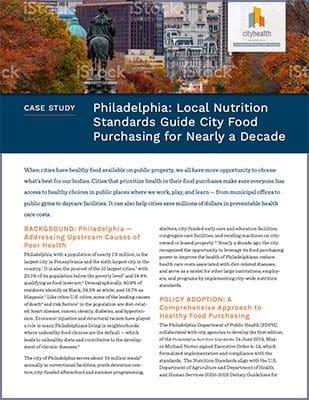by Jessi Silverman, MSPH, RD
Millions of Americans are affected by food insecurity and diet-related illnesses. Unfortunately, the burden of hunger and chronic disease is not distributed equally, with Black, Indigenous, and Latine communities being disproportionately impacted. This past September, the Biden-Harris administration engaged stakeholders to identify strategies for all sectors to work toward ending hunger and reducing diet-related disease in the first White House Conference on Hunger, Nutrition, and Health in over 50 years.
The Biden-Harris Administration National Strategy on Hunger, Nutrition, and Health, released ahead of the conference, lays out a roadmap for achieving these goals across five pillars: improve food access and affordability, integrate nutrition and health, empower all consumers to make and have access to healthy choices, support physical activity for all, and enhance nutrition and food security research.
The strategy focuses on federal government actions and commitments, but also includes a call to action for a whole-of-society response to support each pillar. One of its recommendations calls for local governments to adopt federal food service guidelines in public facilities. Most recently, on March 24, 2023, the Biden-Harris Administration launched the White House Challenge to End Hunger and Build Healthy Communities, encouraging stakeholders across all sectors of society to make bold and impactful commitments that will allow us to collectively end hunger and reduce diet-related diseases by 2030. One of the Challenge areas includes encouraging states, localities, and territories to adopt the federal food service guidelines.

With that, the White House joins major health authorities including the Centers for Disease Control and Prevention (CDC) and the World Health Organization in encouraging governments to adopt nutrition criteria for public food purchasing and food service. CityHealth recognizes cities that adopt such measures with its Healthy Food Purchasing medal.
Healthy Food Purchasing policies can have meaningful benefits. These policies can increase access to healthy foods and beverages in the places where city residents live, work, learn, heal, and play, from office buildings to child care. This is especially critical in settings that disproportionately serve populations burdened by health inequities, such as shelters and correctional facilities.

CASE STUDY: Learn how Philadelphia developed a healthier hoagie roll
Furthermore, Healthy Food Purchasing policies ensure that local governments model a healthy food environment for the consumer and leverage their purchasing power to shift the food supply in a healthier direction.
As referenced by the White House’s National Strategy, the federal government operationalizes healthy food purchasing with the Food Service Guidelines for Federal Facilities (FSG), which include nutrition standards based on the Dietary Guidelines for Americans. The CDC led a federal interagency working group to develop the FSG in 2017. A recent study found that implementing the FSG in government employee cafeterias would be expected to reduce the number of heart attacks, strokes, cases of diabetes, heart disease deaths, stroke deaths, and related health care costs in the employee population over time.
Though developed with federal facilities in mind, the FSG can be applied broadly to public or private worksites or institutions that purchase, serve, or sell food. Some guidelines are considered “standard” (e.g., offering plant-based protein foods three times a week) implementation level, while others are considered “innovative” (e.g., offering plant-based protein foods daily). To earn a silver or gold Healthy Food Purchasing medal, a city food procurement policy must mandate nutrition standards that are at least as strong as the FSG at the standard or innovative level, respectively. Additional criteria are described on the CityHealth website.
While much effort went into developing the National Strategy, making it a reality will be a much greater challenge. As cities look to do their part to end hunger and reduce diet related disease by 2030, there is no better place to begin than leading by example. Check out these resources to help get you started with developing and implementing a healthy food purchasing policy:
- A Roadmap for Comprehensive Food Service Guidelines (Center for Science in the Public Interest)
- Food Service Guidelines Implementation Toolkit (Centers for Disease Control and Prevention)
- Action Framework for Developing and Implementing Public Food Procurement and Service Policies for a Healthy Diet (World Health Organization)
You are also welcome to contact me at policy@cspinet.org for information about getting started.
Jessi Silverman, MSPH, RD, is a senior policy associate at the Center for Science in the Public Interest (CSPI)





